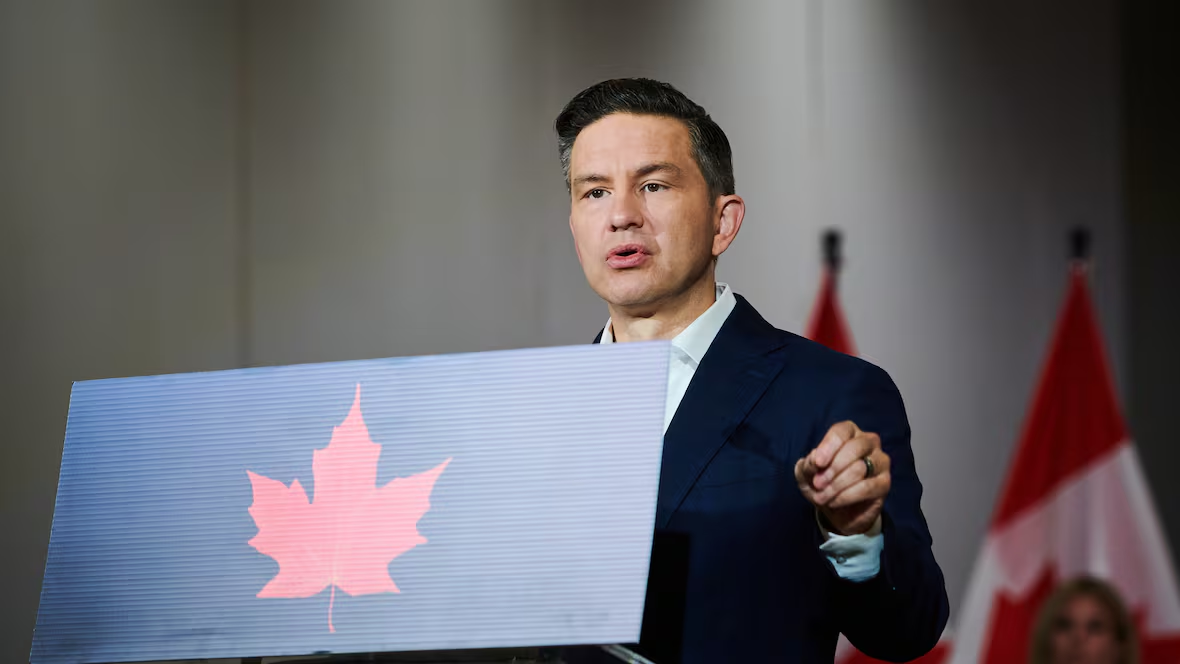
Pierre Poilievre Demands End to Temporary Foreign Worker Program
Conservative Leader Targets Labour Policy in Mississauga Speech
Conservative Leader Pierre Poilievre has launched one of his strongest critiques yet against the Liberal government’s labour and immigration policies, demanding the full elimination of Canada’s Temporary Foreign Worker Program (TFWP).
Speaking at a press conference in Mississauga, Ontario, Poilievre positioned himself as the defender of Canadian workers, accusing Prime Minister Mark Carney’s government of “sacrificing Canadian jobs to serve corporate elites.”
Rising Unemployment Rates Paint a Grim Picture
Poilievre highlighted alarming labour market figures as evidence that Canadian workers—especially youth—are being left behind:
- 1.6 million Canadians are currently unemployed, with almost 400,000 jobless for over two years, marking the worst long-term unemployment rate since 1998.
- The youth unemployment rate (ages 15–24) soared to 14.6% in July 2025, the highest level outside the COVID-19 pandemic.
- Ontario alone has lost more jobs this year than during the Great Recession, according to Poilievre.
He argued these numbers are proof that Liberal economic policies have failed and that Canadians are paying the price through lost opportunities, stagnant wages, and rising living costs.
The Case Against the Temporary Foreign Worker Program
At the centre of Poilievre’s attack was the TFW program, which he claims is being abused by corporations to flood the labour market with low-wage workers, leaving young Canadians unable to compete.
- In the first half of 2025, the government issued 105,000 TFW permits, significantly higher than its self-imposed cap of 82,000.
- Nearly three-quarters of these jobs were in low-wage occupations, where Canadians are also seeking work.
- Companies like Tim Hortons increased their TFW hiring by over 1,100% in just four years.
- Some employers were found offering higher wages, such as $36/hour at Booster Juice, to foreign workers only, bypassing Canadian job seekers.
Poilievre stressed: “These workers are not the problem. They are being exploited. The problem is Liberal corporate elites who would rather import cheap labour than pay Canadians fairly.”
Poilievre’s Proposed Solutions
Poilievre’s plan includes a complete restructuring of Canada’s labour and immigration priorities:
- Scrap the TFW program entirely by allowing current permits to expire.
- Introduce a standalone agriculture program to address genuine labour shortages in farming and food production.
- Ensure Canadian jobs go first to Canadian citizens and permanent residents.
- Focus on training and employing Canadian youth rather than relying on foreign labour.
Beyond immigration, Poilievre tied his proposal to his wider “Canada First” economic plan, promising:
- Lower taxes to help workers keep more of their earnings.
- Repeal legislation like Bill C-69, which he says is stifling energy and resource projects.
- Expand pipelines, mines, and ports to restore Canada’s global competitiveness.
- Strengthen trade relations while reducing dependency on volatile foreign markets.
Criticism of Liberal Leadership
Poilievre used the stage to launch a broader critique of Prime Minister Carney’s record:
- Housing: Accused Carney of failing to deliver on his promise to double home construction, pointing instead to a 13% decline in housing starts this year.
- Trade: Criticized Carney for not securing a promised trade deal with the United States by July 2025, while tariffs from both the U.S. and China continue to hurt Canadian farmers.
- Investment: Pointed out that $62 billion in net investment has left Canada since Carney took office, evidence of what he calls “economic mismanagement.”
- Environment: Slammed the industrial carbon tax, claiming it burdens Canadian exporters and worsens the economic downturn.
Liberal Government’s Response
The federal government, however, defended the TFWP. Immigration Minister Lena Diab pushed back strongly, stating:
- TFW arrivals dropped to 119,000 in 2025, down significantly from 245,000 in 2024.
- Of the 105,000 permits issued so far this year, only 33,722 were for new arrivals—the rest were renewals.
- The TFWP remains critical to industries facing real labour shortages, particularly in agriculture, food services, and hospitality.
Diab argued that without the program, many small businesses would face collapse, further worsening unemployment.
The Debate Moving Forward
The proposal has sparked heated debate across Canada:
- Supporters of Poilievre argue that scrapping the TFWP will protect Canadian workers, restore fair wages, and make housing more affordable.
- Critics, including business leaders, warn that industries like agriculture, hospitality, and caregiving would suffer without access to foreign workers.
Poilievre clarified that his position is not against immigration as a whole. He said: “Immigrants who come to Canada to build a life, pay taxes, and integrate are part of the Canadian promise. My fight is against a broken program that benefits elites while shutting out Canadians.”
The Political Stakes
As Canada faces economic headwinds, affordability crises, and declining global competitiveness, Poilievre’s “Canada First” message is resonating with voters frustrated with the status quo.
With a federal election approaching, the Conservative leader is betting that his call for secure jobs, lower costs, and a self-reliant Canada will unite Canadians seeking change.
For a consultation about Immigration options, reach out to the CAD IMMIGRATION today!

